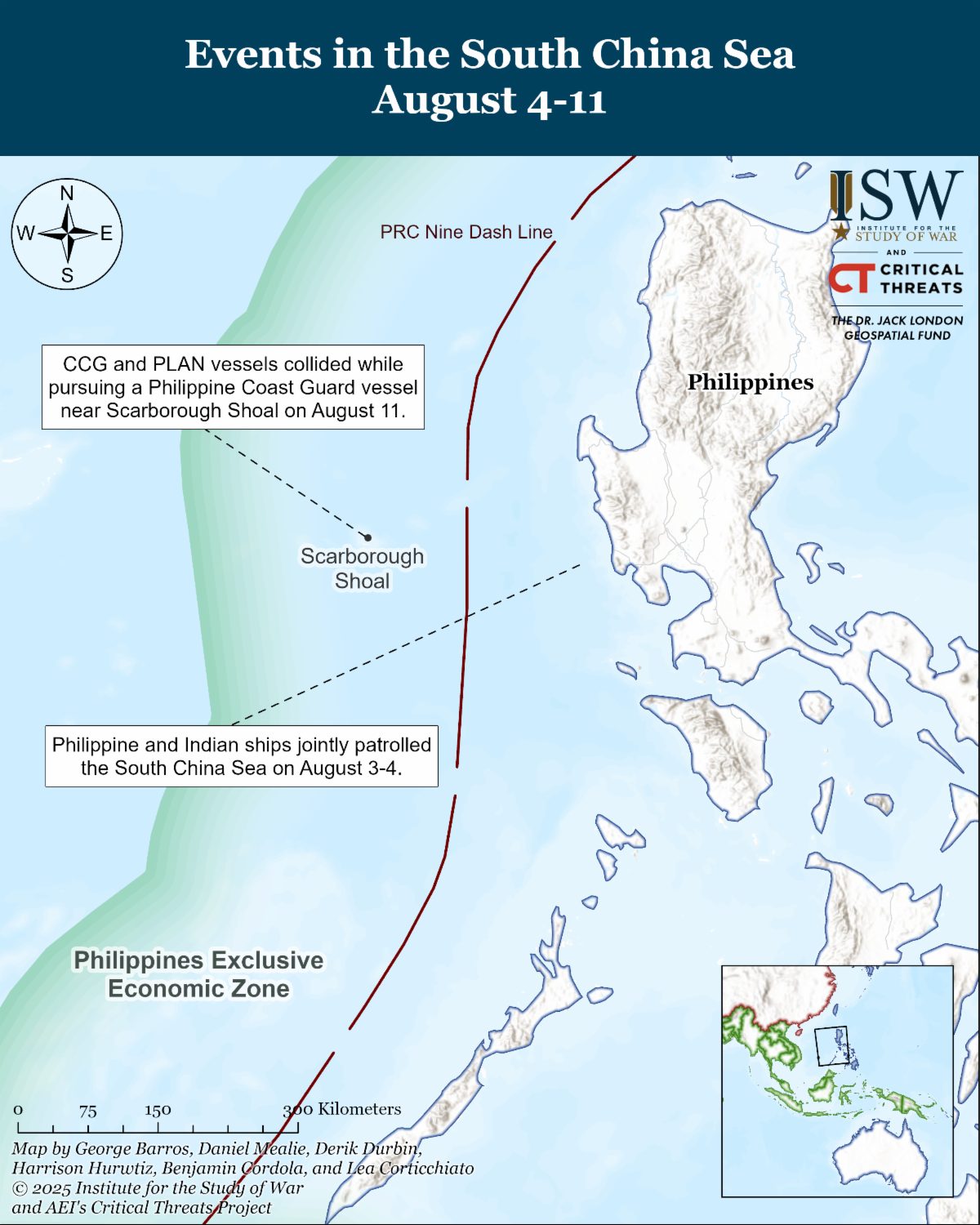The PRC has increased its coercive activities targeting the Philippines in the South China Sea, as Manila has expanded its coalition-building efforts toward other Indo-Pacific countries. The Philippines and India conducted their first-ever combined naval patrol in the South China Sea on August 3-4 in the Philippine Exclusive Economic Zone (EEZ) east of Luzon. Two Philippine missile frigates, an Indian missile destroyer, an Indian anti-submarine corvette, an Indian fleet tanker, and several aircraft participated in the “maritime cooperative activity,” which featured combat exercises involving surface warfare, anti-air warfare, and anti-submarine drills. The end of the exercise coincided with Philippine President Ferdinand Marcos Jr.’s state visit to India on August 4-8. The Philippines and India signed several defense cooperation agreements and announced that they would hold more bilateral and multilateral maritime drills in the future. The PRC responded to the Philippine-Indian patrol with its own “routine patrol,” tailing the Philippine and Indian ships. PLA Southern Theater Command (STC) spokesperson Tian Junli accused the Philippines of “co-opting foreign countries to disrupt the situation in the South China Sea.” PRC Ministry of Foreign Affairs (MFA) spokesperson Guo Jiakun said on August 5 that territorial and maritime disputes should be resolved diplomatically between the parties concerned and that no “third party” should intervene.
Philippine coalition-building efforts coincides with an increased PRC presence and coercion around disputed features in the South China Sea, particularly Scarborough Shoal. CCG and PLA Navy ships tried to block a Philippine resupply mission to fishermen near the shoal on August 11, resulting in a collision between a PLA and CCG ship. The Philippines released video footage that showed the PLA destroyer Guilin move in front of the CCG ship 3104 as it was pursuing a PCG ship, causing the crash. The footage showed serious damage to the CCG ship. PCG spokesperson Jay Tarriela reported that the PCG resupply mission was successful and that the Philippines offered support and medical assistance to the CCG crew following the collision. PRC MFA spokesperson Lin Jian did not acknowledge the crash but blamed the Philippines for “deliberate infringements and provocations.” Lin claimed that the Philippines had sent a “number of coast guard ships, official ships, and so-called fishing boats” into Scarborough Shoal’s territorial waters and that the PRC had been defending its territory. The CCG claimed that the PRC’s operation was “professional, standardized, legitimate and legal” and accused the Philippines of using coast guard ships and official vessels to intrude into PRC waters “under the guise of transporting supplies to fishing vessels.”
The collision incident reflects increasingly aggressive PRC tactics around Scarborough Shoal and will likely intensify tensions as the PRC tries to save face. The involvement of a PLA destroyer in blocking operations represents an escalation. The CCG has typically handled direct confrontations with Philippine ships in previous years, both to control escalation and to portray PRC operations as “legitimate law enforcement” in PRC waters. PLA ships, when present, often formed a perimeter around the area but did not directly engage foreign ships. The PLA’s lack of experience in coordinating blocking maneuvers with the CCG may partly explain the collision. The PLA has become increasingly involved in enforcing PRC claims in the South China Sea over the past year, however, patrolling along the PRC’s “Nine-Dash Line” boundary claim, conducting increasingly frequent drills around Scarborough Shoal, and shining lasers at Philippine government planes.
South Korea postponed combined exercises with the United States, possibly to reduce inter-Korean tensions. North Korea could seek to leverage South Korean policy objectives to force further concessions from Seoul. South Korea’s Joint Chiefs of Staff (JCS) decided to postpone 20 out of 40 planned field training exercises (FTXs) under the Ulchi Freedom Shield (UFS) exercise, a large-scale exercise involving over 18,000 troops each from South Korea and US Forces Korea (USFK). The USF combines Command Post Exercises (CPX) and FTXs based on simulated war scenarios against North Korea. The JCS cited an “extreme heatwave” as the reason for postponement during an August 7 press conference, however, a South Korean Unification Ministry official noted the postponement likely stemmed from Unification Minister Chung Dong-Young’s July 28 recommendation to President Lee Jae-myung to scale down the drills. Chung has promoted policies aimed at reducing inter-Korean military tensions and building a peaceful atmosphere on the Korean Peninsula since taking office on July 25. | 




 [국방부] 「군사기지 및 군사시설 보호법 시행령」 개정안 18일 ...
[국방부] 「군사기지 및 군사시설 보호법 시행령」 개정안 18일 ...
 [국방부] 국방부장관, 태미 덕워스(Tammy Duckworth) 미국 상원...
[국방부] 국방부장관, 태미 덕워스(Tammy Duckworth) 미국 상원...